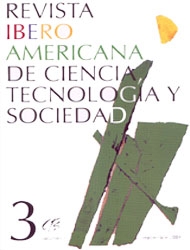As TICs na Cooperação Sul-Sul
O Acordo de Livre Comércio entre a Índia e o Mercosul
DOI:
https://doi.org/10.52712/issn.1850-0013-1059Resumo
Na atual Sociedade da Informação, o que acontece quando duas regiões em desenvolvimento, de continentes diferentes—sendo uma delas mais avançada que a outra em termos de inovações tecnológicas—firmam um acordo de livre comércio? Quais podem ser os impactos positivos e quais os riscos envolvidos?
Downloads
Referências
ABBASI, Z. F. (2001): “Pro-Poor and Gender Sensitive Information Technology: Policy and Practice”, disponible en: http://www.bham.ac.uk/DSA/conf01faisal.doc
CASTELLS, Manuel y HALL, Peter (1994): Metropoles of the World, New York, Blackwell Publishers.
CASTELLS, Manuel (2000): “Is The New Economy Socially Sustainable?”, disponible en: http://www.ul.ie/~icse2000/castellsabstract.html
CASTELLS, Manuel (1997): The Information Age: Economy, Society and culture. Vol. I, II y III, Malden, Mass., Blackwell Publishers.
DESAI, Ashok V. (2004): “Where is India on the Path?”, Businessworld, 19 de enero, New Delhi.
DUNNING, John (2000): Regions, Globalization, and the Knowledge-Based Economy, New York, Blackwell Publishers.
FINQUELIEVICH, Susana (2003): “ICTs and Poverty Reduction in Latin America and the Caribbean”, ICA - IDRC.
FINQUELIEVICH, Susana [Coord.] (2000): ¡Ciudadanos, a la Red!, Buenos Aires, La Crujía.
GOLDMAN SACHS (2003), “Dreaming with BRICs: The Path to 2050”, Global Economics Paper Nº 99, Octubre 1,
http://www.gs.com/insight/research/reports/99.pdf
GURSTEIN, Michael (2003): Community Informatics and Community Innovation. Building National Innovation Capability from the Ground Up, Newark, School of Management, New Jersey Institute of Technology.
GURSTEIN, Michael (2003b): “Community Innovation and Community Informatics Building National Innovation Capability from the Bottom Up”, disponible en: http://www.ciresearch.net/Innovation.doc
GURSTEIN, Michael [Ed.] (2000): Community Informatics: Enabling Communities with Information, Hershey, USA, Idea Group Publishing.
GUZMÁN, Inés (2003) : “ Internet se lanza a mercado informático con producción de software”, InterManagers Argentina, disponible en:
http://www.fing.edu.uy/~ruggia/caiti/CompetitividadIT/ArgentinaForExport.PDF
INTERNATIONALE-ECONOMY BENCHMARKING (2002): “The World´s Most Effective Policies for The E-Economy”, Information Age Partnership, IAP, London, noviembre.
OBERNDORF, Tricia (2000): “Manuel Castells Leads Keynoters”, disponible en: http://www.ul.ie/~icse2000/wow/issue2/manuel_castell_keynote.htm
PROENZA, Francisco (2002): “E-Para Todos: una estrategia para la reducción de la pobreza en la era de la información”, Food & Agriculture Organization (FAO).
RAHMAN, Hakikur (2003): “Information Dynamics in Developing Countries”, en IT For Regional Areas. Using IT: Making IT Happen, Caloundra, Queensland, Australia, 15-17 diciembre.
SENA CORREA, Emilce Norma (2003): “El Mercosur hacia la Sociedad de la Información”, Ciencias da Informaçao Nº 2, p. 37-46, Brasilia, mayo-agosto.
SOFTEX (2003): “Pesquisa Explorando a Economia do Conhecimento no Brasil, Índia e China: a Trajetória de Três Indústrias de Software”, mimeo.
STOLOVICH, Luis (2003): “Qué indican los datos de la industria uruguaya de tecnologías de la información”, Cámara Uruguaya de Tecnologías de la Información, Programa de Apoyo al Software (PASS), disponible en:
http://www.fing.edu.uy/~ruggia/caiti/CompetitividadIT/IT-Uruguay&Afines.htm
Downloads
Publicado
Como Citar
Edição
Seção
Licença
Copyright (c) 2025 CC Attribution 4.0

Este trabalho está licenciado sob uma licença Creative Commons Attribution 4.0 International License.
Todas os números de CTS e seus artigos individuais estão sob uma licença CC-BY.
Desde 2007, a CTS proporciona acesso livre, aberto e gratuito a todos seus conteúdos, incluídos o arquivo completo da edição quadrimestral e os diversos produtos apresentados na plataforma eletrônica. Esta decisão é baseada no entendimento de que fornecer acesso livre aos materiais publicados ajuda a ter uma maior e melhor troca de conhecimentos.
Por sua vez, em se tratando da edição quadrimestral, a revista permite aos repositórios institucionais e temáticos, bem como aos sites pessoais, o autoarquivo dos artigos na versão post-print ou versão editorial, logo após da publicação da versão definitiva de cada número e sob a condição de incorporar ao autoarquivo um link direcionado à fonte original.











